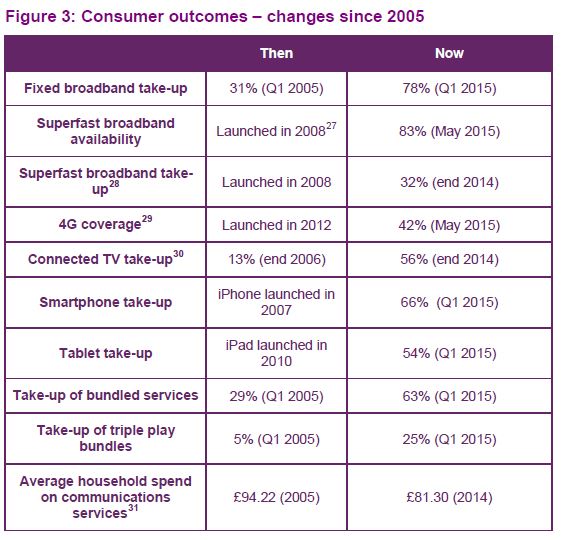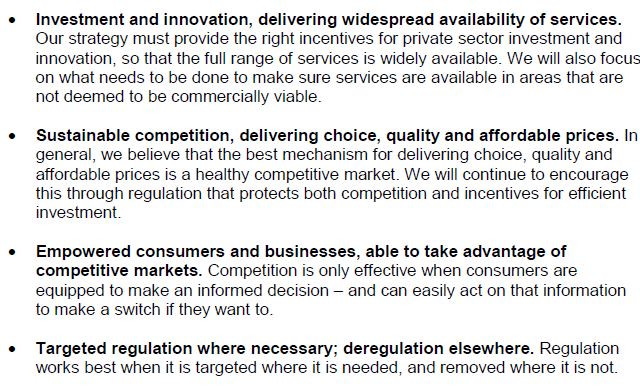Ofcom completes Phase 1 of its Digital Communications Review – now comes the hard bit…
Ofcom today published its discussion document on the challenges facing the UK’s telecommunications sector over the next decade, marking the completion of the first phase of the Digital Communications Review that it kicked off in March. The key aim of the review is to ensure that the UK’s citizens and businesses are well served by high-quality, widely available telecoms services.
Ofcom’s last review on this scale was its Strategic Telecoms Review in 2005 and it spells out the outcomes that have been realised for telecoms users since:
It attributes these improvements in availability and price due to the innovation and investment that has been brought about thanks to effective competition. Yet it also acknowledges that some problems still remain and fresh ones have emerged since its last review. Ofcom has grouped together the good outcomes that it wants to see delivered over the next 10 years into 4 broad headings;
Its views on driving out the coverage and capacity of networks are consistent with the approach set out in its 2014 Infrastructure Report. This means that in fixed they would like to see a Universal Service Obligation of 10Mbit/s – the bandwidth at which the access network becomes less of a determining factor, greater coverage of superfast and more of structured path towards ultrafast. Mobile sees a similar push with the need for greater indoor voice coverage and 4G deployment, although they recognise that at least one MNO now covers 90% of premises. In both fixed and mobile they consider what actions are needed in areas where private investment is not viable.
It is the second point on sustainable competition – generally the report emphasises that Ofcom’s starting point is ‘pro-competition’ – that has received the most attention. This is due to Ofcom asking for opinions on whether the current regulatory structure with BT should be changed – including potential changes to the current model of functional separation to whether full structural separation of Openreach should be considered. Ofcom makes clear that whilst the current structure has benefited users, existing challenges may grow in scope over the next decade. These include the difference in competition in a fibre-to-the-cabinet network and quality of service problems with Openreach.
In this section Ofcom does not support the argument that consolidation is needed to incentivise investment – an interesting comment in light of the current merger proposals. There is also a discussion on whether convergence and the emergence of triple or quad play bundles could reduce effective competition.
Finally it also spells out potential opportunities for deregulation or adapting regulation to market realities flagging some examples such as; switch-off of the Public Switched Telephone Network (PSTN), transition to all-IP interconnection and the switch off of legacy leased lines and even the copper access network.
Commenting on the paper Matthew Evans, CEO of the Broadband Stakeholder Group, said “It cannot be stressed enough how important the applications and services that depend upon good digital connectivity are to consumers, citizens, businesses and Government. This dependency is only going to grow over the next decade when the pace of change is likely to quicken. Therefore it’s welcome that Ofcom is taking an open and comprehensive look at the sector to ensure that the regulatory framework can evolve to cope with new challenges.
Ofcom have made a good start in correctly recognised some potential economic bottlenecks or examples of how market developments could lead to user harm – but the hard part of identifying and implementing solutions or safeguards is yet to come.???
The consultation will be close on 8 October and the BSG will be taking an active role in these discussions.






